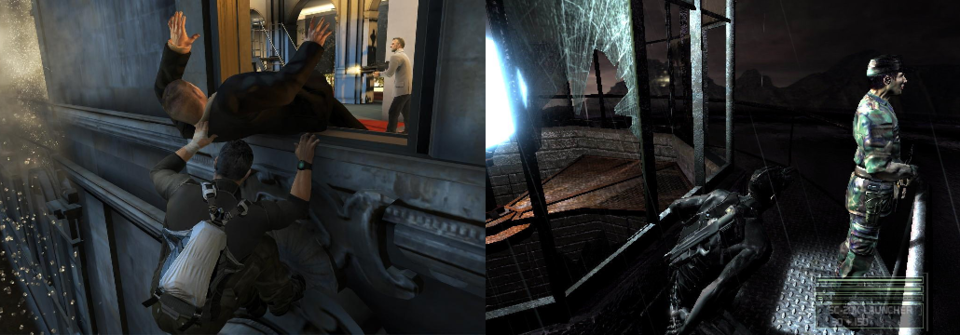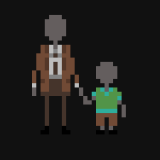Splinter Cell Conviction: Thoughts From My Brain
By JoGribbs 1 Comments

Let me just get this out of the way: Conviction is a great game. If you enjoyed it then I can totally understand that, and I am not trying to talk down to you by complaining about it. I am also going to be talking about Chaos Theory a whole lot, so if you haven't played that game you probably won't see where I'm coming from.
Okay, so, Conviction.
Picture a room with 4 people in it. They're standing together having a conversation.
In Chaos Theory, there's a couple of ways I can tackle this. I can wait to see if the conversation ends and they split up, if it doesn't then I'd have to find a way to either isolate them or scatter them. I could whistle, or brake a light to distract them, which might attract a few of them, or at least focus their attention on one spot so I can take out a few from the back. Alternatively I could shoot one of them in the back of the head and then attempt to take them out one by one as they search the room for me. That would make things quicker, but they'd also know that I'm there, and a straight up fire fight with 3 dudes is something I want to avoid. Alternatively I could try and walk around them and make it into the next room, knowing that I'd have to deal with them later on if I raised an alarm.
The main qualm that people have with Chaos Theory is that performing any actions takes a long time and has no guarantee of success. What I mean by that is that when you walk in to a room like the one above, the game presents you with a problem: you need to get to the other side of the room, but there are 4 guards in the way. The solution to that problem can take a good while to plan, waiting in a corner, or can be read instantly. Either way, there are many solutions to this problem, many of which take around 5-6 minutes to execute. There are others, like risking a frag grenade or just sneaking round them that can be accomplished quickly, but the former tactic is frowned upon and the latter is not the instinctive reaction that most players have to that situation.
So, In Conviction when I find this hypothetical room with the four people, I just shoot them. I can do it manually, or if I have a mark and execute ready, I can tell super spy Sam Fisher to do it for me and he'll dutifully put a bullet in each of their heads. If I don't have a mark and execute ready, and I want to use one (because they look cool and preserve ammo) I can mark three of them, melee or grab one of them and then execute the rest.
I can see what Ubisoft are trying to do; they're trying to make the solutions to each problem faster, and thus curb the inevitable frustration many player's feel when they die. I actually kind of admire this, and I can absolutely see where the design philosophy is coming from.
The problem I have is that they've also decreased the number of solutions to each problem:
- Sam no longer has the ability to knock out enemies rather than kill them. Knocked out baddies could be revived by other guards when dead ones couldn't. There were also some levels where you didn't have the fifth freedom (ie. permission to kill people) so you had to go round slapping people in the face rather than using your knife. I just knocked everybody out: I didn't like the idea of killing people I didn't know when I had the option of knocking them out, but I'm a bit weird like that.
- You can't hide/move bodies any more. I don't have any huge objections to this, since it mixes things up tactically, but it's just another example of limiting the number of tactics the player has at their disposal.
- There are far fewer gadgets, and the ones that remain are extremely simplified. Many of the gadgets are just special grenades that do different things.
- Many of the levels are incredibly linear and force you into fire fights, especially towards the end of the game. In fact, every single level requires you to kill people in some way.
What this means is that every problem is extremely readable. It's very easy to understand just by looking into a room what you have to do. Then, with the mark and execute, the improved shooting and Sam's (canonically odd) faster movements, you can quickly and easily pull off this solution.
So, like I said, I admire that Ubisoft are trying to prevent the player dying over and over again and getting frustrated, but I do not appreciate them making every situation simple and immediately readable, because this removes a lot of the choice the player has when solving each problem. This is the thing that made Chaos Theory so great.
This is Splinter Cell for people who do not like Splinter Cell. Which you might like if you have no interest in prior entries, or you work for Ubisoft's marketing department, but for fans of stealth games it's kind of depressing.
I just want to clarify that I liked Conviction, there are plenty of things it does great, and as Jerry Holkins said, I prefer it to just making another game exactly like Chaos Theory or Double Agent, but I think Ubisoft, in trying to appeal to people outside of the hardcore Splinter Cell fan base, have kind of broken what was great about Splinter Cell in the first place.

Log in to comment